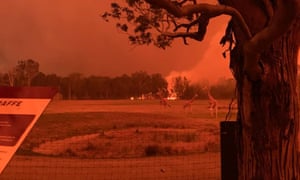Lorena Granados says residents were shocked by the speed of the fire as flames raced into the heritage town early on Tuesday
Follow latest updates on the NSW and Victoria fires
Follow latest updates on the NSW and Victoria fires
Lorena Granados stayed behind in the small New South Wales
village of Mogo, until she could stay no longer. She and her family
members were among the last to flee the bushfire as it began to envelop
buildings along the main street.
“The wind was so strong and furious and it just took over everything,” Granados told Guardian Australia.
“We couldn’t breathe. We couldn’t see. The flames were just ferocious, they were furious, they were angry. There was nothing we could do, we had to pretty much save ourselves.”
Granados and her partner, Gaspar Roman, live in Mogo, just south of Batemans Bay, and own a building in the heritage village centre, from where they run a leather shop. She said they knew about the fire threat late on Monday night and were warned about 5am on Tuesday to consider leaving.
Family members spent much of the morning with three hoses, attempting
to protect the leather shop. But by late morning it was consumed by the
fire front. Granados does not know whether the family home has
survived.“The wind was so strong and furious and it just took over everything,” Granados told Guardian Australia.
“We couldn’t breathe. We couldn’t see. The flames were just ferocious, they were furious, they were angry. There was nothing we could do, we had to pretty much save ourselves.”
Granados and her partner, Gaspar Roman, live in Mogo, just south of Batemans Bay, and own a building in the heritage village centre, from where they run a leather shop. She said they knew about the fire threat late on Monday night and were warned about 5am on Tuesday to consider leaving.
“We fought to the end to save the leather shop,” Granados said.
“It’s just catastrophic. There were three people who came to us that completely lost their homes. Gas bottles were exploding. It felt like we were in a war zone. Of what I’m aware three people have already lost their homes ... we fought the flames, the flames were on top of us. When we left we were basically on fire, we had to leave.
“We didn’t expect it to come so quickly, we were expecting to have to evacuate, but not so soon. My girlfriend rang me [early on Tuesday] and said ‘the fire is coming to Mogo you’ve got to get out of there’. As soon as she rang me I started getting things in the car, we started getting the hoses out and started fighting.
“We weren’t prepared, we didn’t expect it to come so fast. It just took us by surprise.”
Having left town and headed towards the coast, Granados and her family were unable to reach evacuation centres because roads in both directions were cut.

“We’re here on the water and we can see the whole coast burning,” she told Guardian Australia about 2pm, about three hours after fleeing Mogo. “It’s burning right around us. The wind is just swirling.
“I’m feeling really numb at the moment. I don’t know what we’re going to eat tonight, where we’re going to sleep tonight. I don’t know what we’re going to do.
“We can’t get to the evacuation centres because we’re blocked out. We’re blocked off, we can’t go north or south, right now we have nowhere to go.
“Just put the word out there, we’ve lost our really beautiful town.”
Mogo is a small goldrush town with a population of about 300, which has in recent years attracted tourists for its arts and crafts stories and heritage buildings. It is unclear how many homes and other buildings have been damaged, but early accounts suggest there could be dozens.
The town is also the site of the Mogo Zoo, which has Australia’s largest collection of primates, as well as lions, tigers and zebras. Staff at the zoo stayed behind and were able to save its animals.
Zoo director Chad Staples told the ABC small animals were taken inside before the fire front came through.
“Right now in my house there’s animals of all description in all the different rooms,” Staples said.
“Due to the amazing staff here, and a well executed plan, no one is hurt. Not a single animal lost.”
“What we did with the dangerous animals – lions, tigers, orangutans – is we encouraged them to the night den, kept them calm, like nothing was happening, and we were able to protect them at that site.
“The only animals we saw any signs of stress are the giraffe and zebra at a couple of points.
“A couple of hours ago it felt like armageddon here. It was as black as midnight with tinges of red. It was like we were fighting fires in the darkness.
“Right now, we feel that we’ve got a reprieve. Thankfully prayers were answered and the wind changed. Then we were able to get on top of it. Now we’re just very much in a state of readiness, I guess. We’re making sure that nothing flares up, or nothing comes from a different direction now that the wind’s changed.”
No comments:
Post a Comment